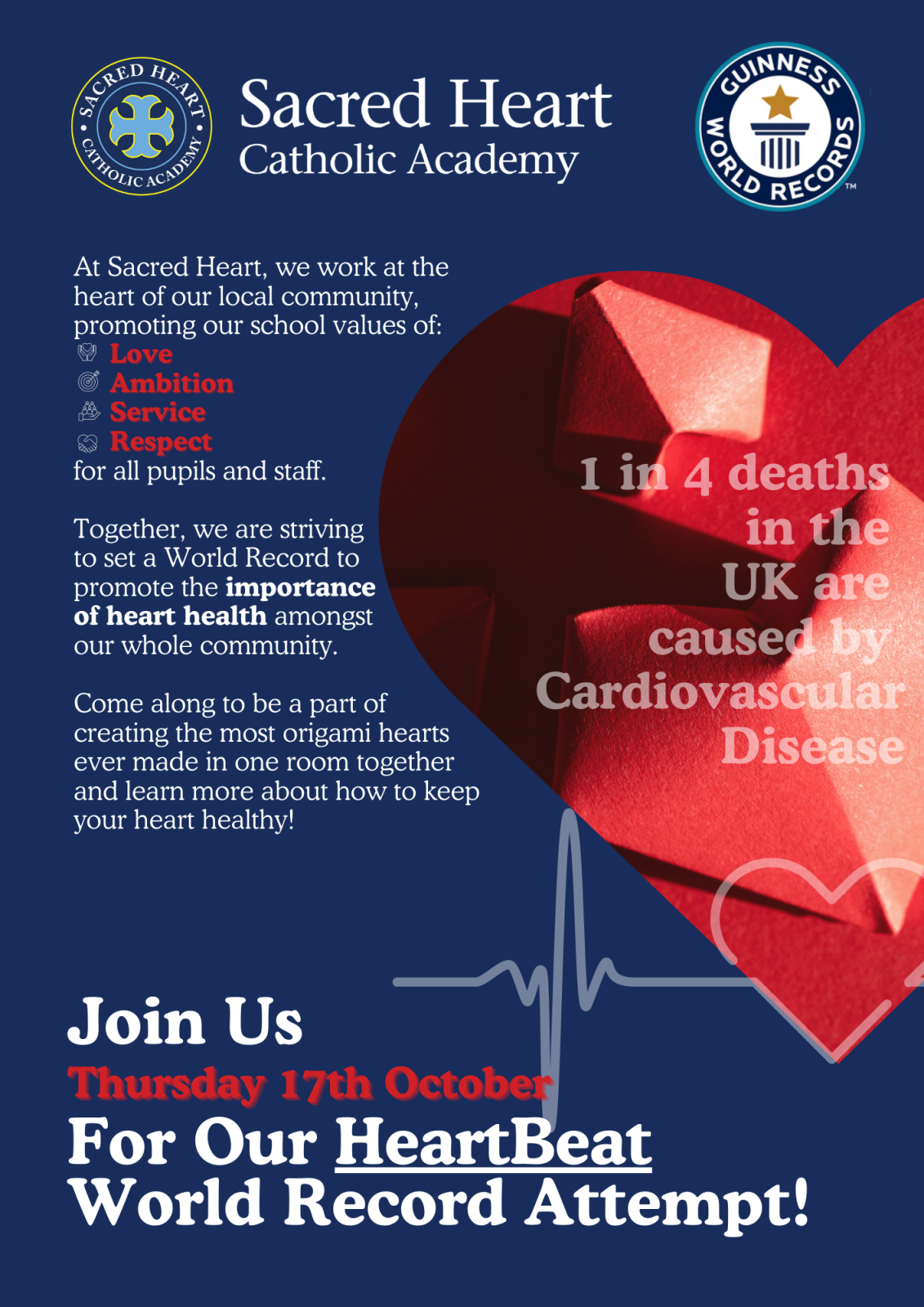Let's Break a World Record Together!
At Sacred Heart, we are passionate about promoting healthy lifestyles for all our pupils and particularly promoting the importance of heart health in line with our values of love and service.
If your school or community group would like to get involved with our HeartBeat World Record attempt, we would love to hear from you!
Get in touch via the below and we will arrange for you to join us for an exciting afternoon together on Thursday 17th October.
Telephone: 0151 931 2971
Email: admin@shca.pfcmat.org 
You can find more information on how to support a healthy heart through the British Heart Foundation:
Heart Health Support From The British Heart Foundation
Heart health for the whole family is hugely important - did you know that as many as one quarter of deaths in the UK are attributed to heart disease? Some key tips for keeping your heart healthy are:
Being active
This can reduce your risk of developing some heart and circulatory diseases by as much as 35%. Regular physical activity:
- helps control your blood pressure and keep it within healthy levels
- raises your levels of good cholesterol, and reduces the bad cholesterol
- can help to control your blood glucose levels, reducing your risk of Type 2 diabetes
- increases the number of calories you burn and helps you maintain a healthy weight.
Aim to do at least 150 minutes of moderate intensity activity per week. This is anything that raises your heart rate, and makes you breathe faster and feel warmer, like brisk walking or cycling. You can spread out the 150 minutes over the week.
You can even do short bursts of activity – every minute counts. You should also aim to do muscle strengthening activities like using hand weights, climbing the stairs, gardening such as digging, or carrying heavy shopping on at least two days a week.
A well-balanced diet.
-
Strict diets are hard to sustain, healthy eating isn’t about cutting out or focusing on individual foods or nutrients. There are foods we need to eat more of, like fruit and vegetables, and others we need to eat less of, which are foods high in saturated fat, sugar and salt. Eating healthily can be tasty, simple and fun. It’s about making small, long-term changes and enjoying the food you eat.
-
5 ways to get your 5 a day: fresh; frozen; dried; juiced; tinned (in juice or water).
-
Beans and pulses are a more sustainable source of protein than meat. Aim to have two portions of sustainably sourced fish per week. Red and processed meat such as sausages, bacon and cured meats have been shown to increase the risk of illnesses such as cancer and heart disease. If you eat more than 90g a day (six thin slices of bacon or two medium sized sausages), try to cut down to no more than 70g per day.
-
Foods to eat less often and in small amounts: saturated fat, salt and sugar Replacing animal fats such as butter with plant-based oils like olive oil and vegetable oil can help. Eating too much salt can increase the risk of developing high blood pressure. If you prefer salty foods, try squeezing some fresh lemon juice onto your food. To reduce how much sugar you take, try doing it slowly over time instead of making a big sudden change.
-
Aim to have the equivalent of 6-8 glasses of fluid a day. Water, lower fat milk and sugar free drinks including tea and coffee all count. Limit fruit juice and/or smoothies to a total of 150ml a day.
Reduce your risk factors

 0151 931 2971
0151 931 2971


